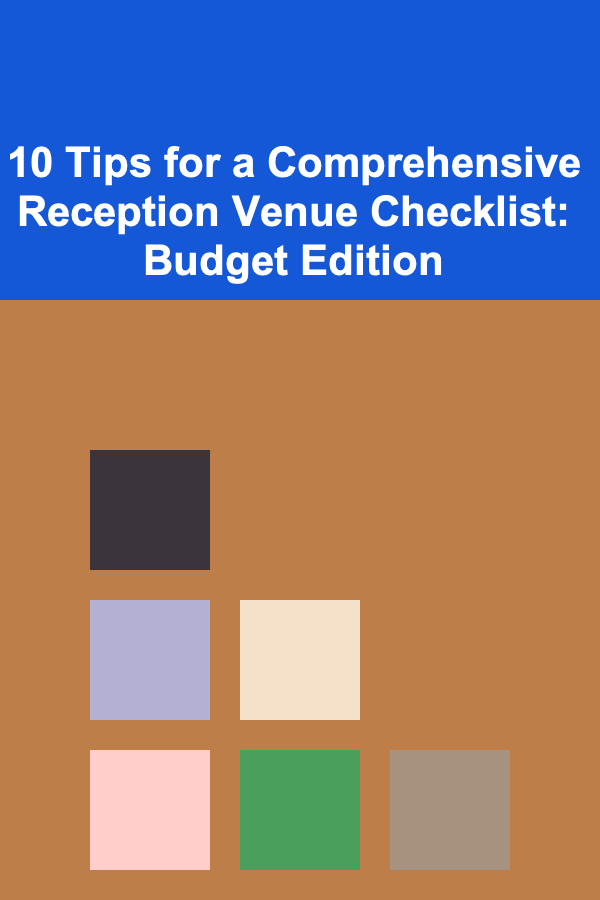
10 Tips for a Comprehensive Reception Venue Checklist: Budget Edition
ebook include PDF & Audio bundle (Micro Guide)
$12.99$11.99
Limited Time Offer! Order within the next:

Planning an event, whether it's a wedding, corporate gathering, or a milestone celebration, involves numerous considerations, and one of the most significant decisions you will make is selecting the right reception venue. The venue is where your guests will spend a significant portion of the event, and it sets the tone for the atmosphere, the comfort of attendees, and the overall flow of the occasion. However, finding the perfect venue while staying within a budget can often feel like an overwhelming task. With the right approach, though, it is entirely possible to strike a balance between your vision and your financial constraints.
This article will provide you with 10 essential tips for creating a comprehensive reception venue checklist, helping you evaluate options effectively while keeping your budget in check. Let's explore how you can make the most out of your reception venue selection process without breaking the bank.
Set Your Budget First
Before you start browsing venues or contacting event coordinators, it's critical to set a clear and realistic budget for your venue. Establishing this upfront will help you narrow down your choices and avoid wasting time considering venues that are out of your price range.
How to Set a Venue Budget:
- Consider the Total Event Budget: The venue is typically one of the largest expenses in event planning, but it should still be a part of the overall financial picture. Factor in catering, decorations, entertainment, and other associated costs when deciding how much you can allocate to the venue.
- Include Hidden Costs: Venues often have additional charges that might not be immediately obvious, such as service fees, insurance, parking, or cleaning charges. Ensure you ask about these costs early to avoid surprises later.
- Prioritize Spending: Depending on the type of event, some features may be more important than others. If the atmosphere is more important than the location, for instance, you might be able to negotiate a lower rate in exchange for a less prime location.
Setting a budget early ensures that you're always working within your financial limits and helps avoid making compromises in other areas of the event later on.
Research Venue Options
Once you've established your budget, start researching venues that fall within your price range. This can include browsing websites, reading reviews, visiting potential locations, and getting recommendations from others who have planned similar events.
How to Research:
- Online Search: Many venues offer extensive details on their websites, including photos, pricing, floor plans, and booking policies. Use these resources to compile a list of venues that fit your needs.
- Social Media & Reviews: Social media platforms like Instagram, Pinterest, and Facebook can provide a more informal view of a venue's atmosphere, while review sites like Yelp, Google Reviews, or WeddingWire can give insights from past customers.
- Ask for Recommendations: Your network can be a great resource for finding venues that may not show up in a simple search. Ask friends, colleagues, or even vendors who have worked in the area.
With this research, you can create a list of venues to visit and evaluate in person, narrowing down your choices based on the features that matter most.
Assess Location and Accessibility
The location of your reception venue plays a significant role in both the cost and the experience. A convenient location for your guests, with easy access to transportation and ample parking, can make the event more enjoyable and less stressful.
Things to Consider:
- Proximity to Accommodations: If many of your guests are coming from out of town, it may be helpful to find a venue close to hotels or accommodations. You might even be able to negotiate discounted room rates for guests if the venue has partnerships with local hotels.
- Transportation: Consider whether the venue is easily accessible by public transport, and whether parking will be sufficient. If the event is in a city center, you may need to arrange valet services or rental shuttles.
- Convenience for Guests: The easier it is for your guests to attend, the better. A remote location may sound romantic, but it can be a significant hindrance to guest attendance, especially if transportation costs are high.
Selecting a location that balances convenience and cost will keep your event running smoothly and contribute to a positive guest experience.
Capacity and Layout Flexibility
The size of the venue should be one of the first things you assess. If the venue is too small for your guest list, the event will feel cramped. If it's too large, your guests might feel disconnected or uncomfortable.
Capacity Considerations:
- Guest List Size: Ensure that the venue can comfortably accommodate your guest list. Most venues provide a maximum capacity based on seating arrangements, so make sure you've solidified your guest count before booking.
- Room Layout: Some venues offer flexibility in how they arrange space, allowing you to create a layout that works for your event. For example, round tables might suit a wedding reception, while conference-style seating may be better for a corporate event.
- Expanding or Reducing Space: Check if the venue allows for partitioning or combining rooms to adapt to different crowd sizes. This flexibility can be a huge advantage, especially if you're unsure about exact attendance numbers.
Be sure the space matches the mood and style of the event, while also offering practical flexibility based on your needs.
Understand What's Included in the Price
Each venue will have its own pricing structure, and it's crucial to understand exactly what is included in the quoted price. The cost of the venue may encompass more than just the rental of the space itself.
What to Ask About:
- Catering: Some venues offer in-house catering, while others may allow you to bring your own vendors. Be sure to understand what is and isn't included, as catering costs can vary significantly.
- Tables, Chairs, and Linens: Many venues include tables, chairs, and basic linens in the cost, but some may charge extra for upgrades or special requests.
- Audio-Visual Equipment: If your event involves presentations, music, or speeches, inquire about the availability of AV equipment. Many venues charge extra for sound systems, microphones, or projectors.
- Decor and Setup: Some venues include basic decor or have a team that handles the setup and breakdown. This can save time and money on event coordination.
Reviewing these details will help you understand whether the price is truly all-inclusive or if there are hidden costs you'll need to account for.
Evaluate Available Amenities and Services
When choosing a venue, you must also consider the additional services and amenities available that can enhance your event experience, especially when working within a budget.
Things to Look For:
- Event Coordinator: Some venues offer an in-house coordinator to help with logistics and planning. This service can be invaluable for relieving the stress of event planning, but be sure it fits within your budget.
- Catering Options: Many venues offer an on-site catering team that can provide everything from appetizers to full meals. Compare these options with hiring an external caterer to determine which is more cost-effective.
- Entertainment Space: If your event requires live music, dancing, or other entertainment, ensure that the venue can accommodate these activities.
- Lighting and Ambiance: Check whether the venue offers adjustable lighting to suit different parts of the event. Some venues may provide uplighting or other elements to enhance the atmosphere.
These services can either be bundled into the venue's cost or come at an additional charge. Either way, make sure you're clear on what is available and what you'll need to source independently.
Check for Hidden Fees
Hidden fees are the bane of any event planner's budget. It's important to ask about every potential extra cost upfront to avoid any unwelcome surprises later.
Hidden Costs to Ask About:
- Corkage Fees: If you plan to bring your own alcohol, the venue may charge a corkage fee.
- Service Fees: Some venues charge a service fee, typically a percentage of the total cost of the venue rental or catering.
- Security Deposits: Most venues will require a deposit to secure the space, which may or may not be refundable based on the condition of the venue after the event.
- Cleaning Fees: Cleaning fees may be added if the venue requires extra work after the event to restore the space to its original condition.
Asking for a complete breakdown of costs and policies ensures you can avoid unforeseen expenses.
Consider the Venue's Restrictions
Every venue will have its own set of rules and restrictions, and it's essential to be aware of them when evaluating your options.
Restrictions to Keep in Mind:
- Noise and Music Curfews: Many venues have curfews or restrictions on noise levels, which may impact the flow of your event.
- Alcohol and Catering Policies: Venues may have specific policies about serving alcohol or may require you to use their in-house catering team.
- Decorations: Some venues have strict guidelines about decorations, such as no open flames, no hanging items from the ceiling, or limitations on the type of materials used.
Knowing these restrictions in advance will help you decide if the venue is suitable for your event's specific needs.
Negotiate for a Better Deal
Just because a venue lists a price doesn't mean it's set in stone. Don't hesitate to negotiate, especially if you're booking during off-peak times or securing multiple services with the venue.
Tips for Negotiating:
- Ask for Discounts: Venues may offer discounts during non-peak seasons or days of the week. Ask about lower rates for hosting an event on a Sunday or weekday evening.
- Bundled Services: If you're booking multiple services (such as catering and AV equipment), inquire about bundled discounts.
- Flexible Payment Plans: Ask about flexible payment schedules, including the possibility of paying in installments to spread out the cost over time.
Negotiating can make a significant difference, and it may help you stay within your budget while still getting everything you need.
Trust Your Instincts
Finally, once you've evaluated all the factors, trust your instincts when choosing a venue. The right venue should feel like a natural fit for your event, reflecting the overall vibe you want to create while also being a practical choice within your budget.
Consider:
- The Atmosphere: Does the venue match the tone of your event?
- Guest Comfort: Is the venue spacious, accessible, and comfortable for all guests?
- Your Confidence: Do you feel comfortable and confident in your choice?
Your gut feeling about a venue is just as important as any checklist or financial breakdown. If it feels right, it likely is.
Conclusion
Choosing the perfect reception venue while sticking to a budget requires careful planning and attention to detail. By following these 10 tips, you'll be well on your way to selecting a venue that offers the right balance of quality, affordability, and convenience. Whether you're hosting a wedding, a corporate event, or a celebration, the venue sets the stage for an unforgettable experience. By being diligent in your research and budgeting, you can ensure that your reception venue choice meets both your vision and your financial constraints.
Reading More From Our Other Websites
- [Home Pet Care 101] How to Manage Your Pet's Anxiety During Fireworks or Storms at Home
- [Home Rental Property 101] How to Protect Your Security Deposit on Houses for Rent
- [Home Space Saving 101] How to Ditch the Bulk: Filing Cabinet Alternatives for Small Home Offices
- [Home Pet Care 101] How to Make Pet-Friendly DIY Projects for Your Home
- [Personal Care Tips 101] How to Use Concealer for Contouring and Highlighting
- [Skydiving Tip 101] Breaking the Limits: The Most Thrilling Skydiving Records Ever Set
- [Personal Care Tips 101] How to Choose a Hand Cream with SPF Protection
- [Home Renovating 101] How to Determine Interior Renovation Cost for Different Rooms
- [Personal Care Tips 101] How to Use Makeup Primer to Achieve a Smooth Makeup Finish
- [Weaving Tip 101] Tech Meets Tradition: Integrating LED Lights into DIY Weaving Projects

How to Set Up an Effective Home Office Space
Read More
How to Explore Electric Marine Vessels
Read More
Finding Serenity in the Deserts of Jordan
Read More
10 Tips for a Cozy TV Show Binge-To-Do List
Read More
How to Create Intricate Metal Cutouts with Plasma Cutting
Read More
10 Tips for Thank You Cards for Funeral Sympathy
Read MoreOther Products

How to Set Up an Effective Home Office Space
Read More
How to Explore Electric Marine Vessels
Read More
Finding Serenity in the Deserts of Jordan
Read More
10 Tips for a Cozy TV Show Binge-To-Do List
Read More
How to Create Intricate Metal Cutouts with Plasma Cutting
Read More